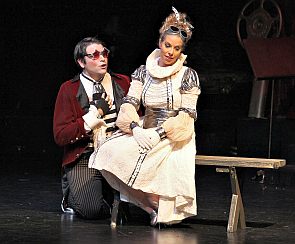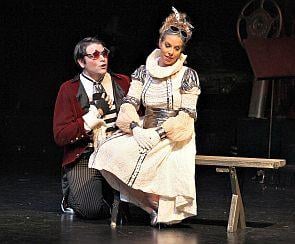Berkeley Opera’s performance of The Tales of Hoffmann, which opened Saturday at the Julia Morgan Center, is a resounding success.

pays court to Olympia
Angela Cadelago
in the first tale
Jacques Offenbach’s opera, unfinished when he died, has been performed in widely different editions. Librettist David Scott Marley, benefitting from recent discoveries of Offenbach’s sketches for the last act, has returned to the original librettist’s work and also to the three actual tales by E.T.A. Hoffmann on which the opera is based.
Marley’s version makes convincing sense of the opera, and with its use of spoken dialogue is well adapted to the Julia Morgan space. He has returned to Offenbach’s original order of the three acts, and has eliminated music written by other composers. And the libretto abounds in delightful wordplay and audacious rhymes.
The role of Hoffmann’s friend Nicklaus is written for a mezzo-soprano. In this production, Hoffmann’s Muse announces at the beginning that she is about to inhabit Nicklaus’ body, to protect Hoffmann and bring him back to his real calling as a poet. Nora Lennox Martin’s performance as Muse/Nicklaus was outstanding. Her singing, speaking, moving, and acting were superb. She made a strong case for Marley’s view of the opera as one story rather than three.
Another support for Marley’s view is Offenbach’s casting of one soprano in four roles. Hoffmann loves a singer, Stella, but they are estranged. As he tells his friends about three women he has encountered, each is some imaginary version of Stella. The first is Olympia, a dancing doll. Angela Cadelago sang Olympia’s cascading coloratura with panache, and acted the robot convincingly. For the second act, as the aspiring singer, Antonia, she was a warm real person (and no slouch at accompanying herself on the piano). In the third act she was the ambitious, money-loving Giulietta, ready to betray Hoffmann for a diamond. Olympia breaks, Antonia dies, and Giulietta goes off with the Devil.
The four devilish parts are sung by one man. As Councilor Lindorf, he captures Stella by intercepting a love letter she has written to Hoffmann asking for a reconciliation. As Coppola and Dr. Miracle, he destroys Olympia and Antonia, and as the sorcerer Dapertutto he buys off Giulietta. All four villains were embodied in baritone Paul Murray, whose powerful voice and magnetic stage presence made him a standout.
Ardent Poet
Adam Flowers sang the role of the poet Hoffmann, and his warm, true tenor voice suited the role. He conveyed well Hoffmann’s varying states of illusion and disillusion, dazzled by Olympia and shocked to see her as a broken doll, ardent in his wooing of Antonia, embittered by Giulietta’s heartlessness. There were some moments, especially toward the end, when his voice was somewhat overwhelmed in ensemble. Perhaps Ernest Knell could have reined in his orchestra occasionally. But on the whole, the orchestra played a stellar role under his sure direction.
Wayne Wong and George Arana both did fine work in quadrupled supporting roles. Brian Rosen and Alexander Frank sang Herman and Nathaniel and were a prominent force in the excellent chorus. Alex Sardelich, avoiding the usual scene changes in accordance with Marley’s idea of having all the tales told in the same place, created a single effective set, wide and serving multiple purposes. Choreographer Kelcey Jay Poe had the chorus dancing admirably in the available space, and Emilica Sun Beahm’s costumes were well-suited to each character.
Phil Lowery’s direction is supposedly influenced by “steampunk.” However that is defined, it works very well, most obviously in all the technology surrounding Olympia, and perhaps also in an antiestablishment stance. Among many charming details in the production: A draft on the “Bank of Lehman” is found to be fraudulent. Hoffmann sings his tale of “Little Jack,” making Jack dance on a table by using his arms for Jack’s legs and Nathaniel’s arms for Jack’s. A large barrel, part of the inn where Hoffmann and his friends meet, serves as a sort of revolving door for entrances and exits. Olympia is carted off on a dolly. A portrait of Antonia’s deceased mother morphs into a moving, singing person (sung by Sara Couden in a voice remarkably similar to her daughter’s).
Marley portrays Hoffmann as a heavy drinker whose fantasies are fueled by alcohol. He is in a drunken stupor when Lindorf walks off with Stella in the end. He has been appalled to discover that he has been duped into giving up his image to one of the villains; there is a suggestion of having lost his soul to the Devil. I’m not so sure. The fight for his soul has been waged between his Muse and the Devil, and in fact his Muse has won. He starts writing poetry instead of throwing himself at a woman who is several figments of his imagination. If Stella is so easily deceived, let her go. And voilà! — a happy ending.

